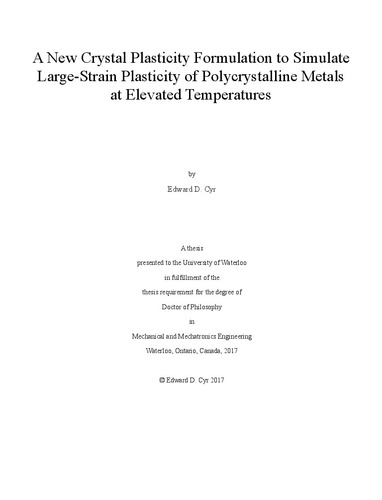| dc.description.abstract | This dissertation explores the plasticity polycrystalline metals, with particular attention paid to aluminum and its
alloys. Specifically aluminum Al-Mg sheet alloys, which are currently replacing steel parts for panel and some
structural componentry in the automotive industry. At the forefront of this transition, is the problem of poor
room-temperature formability of the aluminum sheet when compared to its steel counterparts. A promising solution to
this has been the use of warm-forming to increase formability, preventing redesign of automotive parts from steel to
aluminum (Li and Ghosh, 2003). In this thesis, a new constitutive framework and methodology is developed to
accurately model elevated temperature behaviour of polycrystalline aluminum.
This study describes a picture of the physics behind slip dominated deformation in polycrystalline metals, and the
mechanical characterization techniques used to determine modeling parameters for crystal plasticity. A review on
modeling techniques and published work on the versatility of crystal plasticity theory and application is also
presented. An initial model is then developed for a fully temperature dependent crystal plasticity framework. The
model employs a generic hardening law to study the effect of temperature on material hardening, and conclusions are
made on the lack of microstructural correlation between the model and physical behaviour of the material. The same
framework is then implemented in the well known Marciniak-Kuzynski (1967) based limit strain formulation as an
application study with Chang and Asaro (1981) type hardening. Temperature dependency is studied and formability is
predicted for different aluminum alloys. The study reveals that, again, phenomenological-based hardening is only
satisfactory for predicting elevated-temperature behaviour, and results are very sensitive to model input parameters.
In the second half of this dissertation, a physical model is carefully developed from fundamental dislocation theories.
The model is formulated on the basis of accumulation of dislocations as the dominating strengthening mechanism in
polycrystals, introduces recovery as a thermally activated process leading to temperature dependent softening. The
model is used to study temperature dependency of slip deformation in pure aluminum, and the correlation between
physical processes and model parameters. The model is able to capture and predict deformation response, as well as
suggest explanation to the influence of temperature on microstructural behaviour. Finally, the model is applied to
study the temperature dependency of microstructural parameters in 5xxx series Al-Mg sheet alloys. Experimental data
is used to characterized material parameters at warm forming temperatures, and the model is used to predict
stress-strain response. The model is then used to discuss the effect of temperature on two different alloys and suggests
explanation on the microstructural causes leading to variation hardening behaviour between the two alloys over the
temperature range studied. The work then concludes the improvement of model predictability, and the utility of such a
model in microstructural design. | en |

